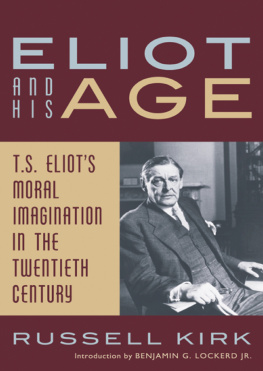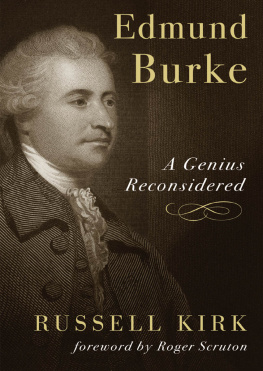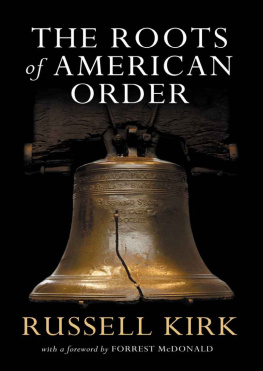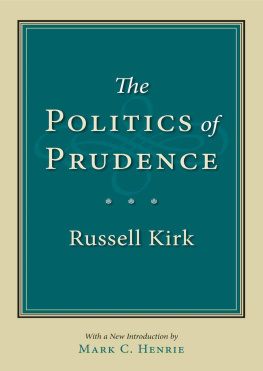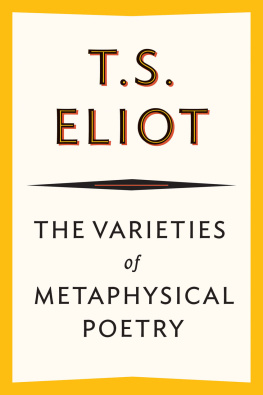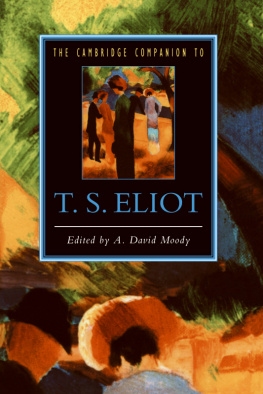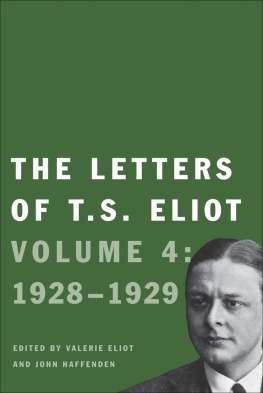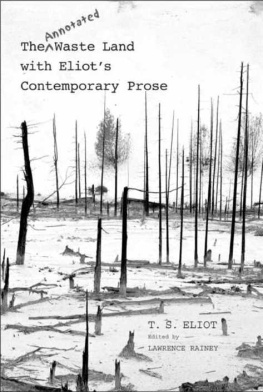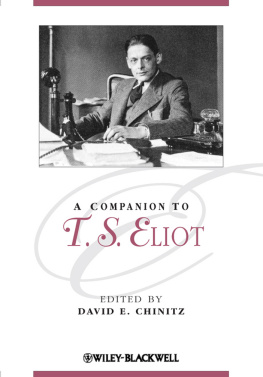Eliot and His Age
T. S. Eliots Moral Imagination
in the Twentieth Century
Russell Kirk

Wilmington, Delaware
Eliot and the Follies of the Time
N owadays, a few years after the death of T. S. Eliot, we vacillate in a literary interregnum. From 1960 to 1970, say, most survivors from what I call the Age of Eliot entered one after another into eternity; and though here and there some stalwart Gerontion still writes, or some hopeful new talent starts up, for the most part we encounter literary ephemera, or else the prickly pears and Dead Sea fruit of literary decadence.
Yet no civilization rests forever content with literary boredom and literary violence. Once again, a conscience may speak to a conscience in the pages of books, and the parched rising generationlike bushmen at the back of beyondmay grope their way toward the springs of moral imagination. There endure, however much defaced and neglected, what Eliot called the permanent things.
A fresh examination of the work of T. S. Eliot may assist in that reinvigoration. This book is an endeavor at once to criticize an important body of literature, and to relate that literature to the events and circumstances and prospects of civilization in this century.
As yet, we have no biography of Eliot, nor any large collection of his letters.between his private emotions and the sentiments expressed in his poems, Eliot desired no Boswell.
Although this book is not that biography, a prefatory note on Eliot the man may be found appropriate here. He had many acquaintances, some friends, few intimates. Others knew him better than I did, but I do not believe that I failed to apprehend his character. People who are acquainted with Eliot only through his writings may fancy that he was a man chilly and almost impersonal. The truth was otherwise.
We first met in 1953, in an obscure little private hotel, unattractive wicker furniture in its parlor, where Eliot was staying in Edinburgh before the first performance of The Confidential Clerk. I called upon him because he had persuaded Faber & Faber, of which firm he had been a director for many years, to publish the London edition of a fat book of mine, and because I had been asked to criticize The Confidential Clerk in the pages of The Month.
Kindliness, simplicity, and directness were among Eliots characteristics, I discovered; and this impression was confirmed by our later meetings, in London, over the yearsat the Garrick Club or in his little office upstairs at Faber & Faber, in Bloomsbury. Disciplined like his literary style, Eliots mind was humane with a consistency rare today. It was easy to talk with him, because he was both keenly intelligent (though never abstract in discourse) and gracefully unassuming.
A thoroughly different sort of personSomerset Maughamargued two decades ago that it has become impossible for us moderns to venerate anybody. True, there remain few men of our time whom anyone is tempted to venerate. Yet though Eliot never expected reverence for himself, and would have smiled affably at the notion, he deserved to be revered, in those later years of his, if anybody so deserved. Nowadays I hesitate to attribute compassionwhat with the mawkish corruption of that wordto a sensible man. Yet compassion, in its root sense, could be read in Eliots face: not the condescending sentimentality of the humanitarian, but a consciousness of the community of souls. and again there came into my head, as I sat with Eliot, those lines from his Preludes which he had written in his Harvard days:
I am moved by fancies that are curled
Around these images, and cling:
The notion of some infinitely gentle
Infinitely suffering thing.
Those lines had struck Wyndham Lewis, too, in 1915. Lewis then, and I later, did not take Eliot himself to be pathetic: he had passed through suffering, by the time I knew him, to resignation and hope; but the vanity of human wishes clung about him always, not unpleasantly. His appetites were reduced, his manners perfectand his patience boundless. He might have sat for Sir Thomas Browne, or for his own friend Father Martin DArcy, as an exemplar of Christian morals.
All about him, in those late years when I knew Eliot, he perceived inner and outer disorder, but was not dismayed. One winter I told him that he ought to come with me to Cyprus. (He could not have walked with me, then, as he had walked beside the Loire and in Brittany with Wyndham Lewis, just after the First World War; but if I had sat by him in the roofless Queens Lodging of the castle of St. Hilarion, say, where the cliff-face drops away more than two thousand feet, I might have known one of Eliots moments when time and the timeless intersect.) What with his arthritis, he may have been tempted; but he had duties to perform. True, he said, his doctor had advised him that he ought to spend the cold months in some dry, quiet placeEgypt, perhaps. At that hour, Egypt was made hideous by revolution and massacre; Eliot suggested that the doctor was rather an old-fangled practitioner, not given to chewing the newspapers.
His physicians unworldiness notwithstanding, I replied, really he and I ought to embrace that prescription: at Cairo or Alexandria, or in the City of the Dead at Luxor, we might end gloriously as two Roman candles ignited by Saracens, not with a whimper but a bang. Eliot smiled, perhaps regretfully, aware that nothing melodramatic ever had occurred to him, nor wouldexcept in the realm of mind and spirit.
Standing still while men were arming, Eliot lived secure, full of years and honors, amidst the crash of empires. He might have said, with Don Quixote, I know who I am, a rare discoveryteaching resignation to any man who makes itthat Eliot had achieved painfully. Not attracted by power or wealth, Eliot was content to be poet and critic. He had no passionate desire for the fame that settled upon him, and was not easily wounded by hostility among reviewers and ideologues.
Yet for the present condition of culture, and for the future of man, Eliot knew a concern that (at least by 1953, when we met) he had ceased to feel for himself. For five decades, from Prufrock and Other Observations to the essays that were published after his death, Eliot labored to renew the wardrobe of a moral imagination, that generation might link with generationand that, beyond the boredom and the horror, men might perceive the glory.
Through poem and play and essay, Eliot hoped to work upon his agethrough what he wrote, not through what he experienced privately; and in that spirit this book has been undertaken. With what might have been arrogance in a man less amiable by nature, Thomas Stearns Eliot aspired to represent in his day the power of moral imagination possessed by his Mantuan and Florentine exemplars. He was an ethical poet, bent upon redeeming the time. What Unamuno called the tragic sense of life was Eliots to the fullalthough, as old Robert Burton had written in The Anatomy of Melancholy, melancholy men are the wittiest. In his austere and subtly humorous way, Eliot perceived his own age more poignantly than did anyone else in the republic of letters.
T. S. Eliot was the principal champion of the moral imagination in the twentieth century. Now what is the moral imagination? The phrase is Edmund Burkes. By it, Burke meant that power of ethical perception which strides beyond the barriers of private experience and events of the momentespecially, as the dictionary has it, the higher form of this power exercised in poetry and art. The moral imagination aspires to the apprehending of right order in the soul and right order in the commonwealth. It was the gift and the obsession of Plato and Virgil and Dante.

